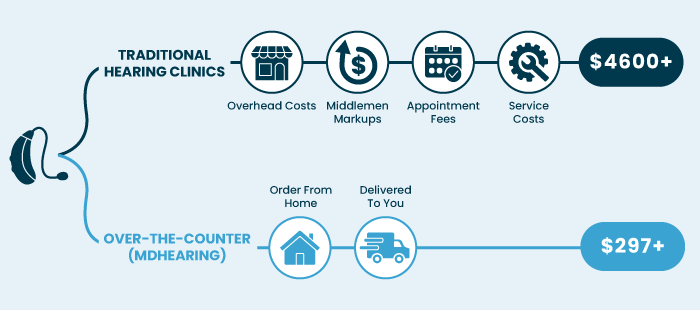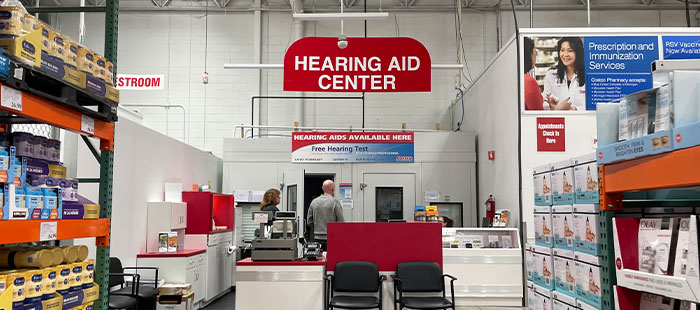If you’re one of the millions of people worldwide living with hearing loss, you may be considering hearing aids. However, if you’ve been to an audiologist or hearing clinic, you’ve likely been hit with sticker shock. How will you afford the average cost of $4,600 a pair!?
In 2025, hearing clinics are still charging anywhere from $2,500 to over $8,000 for a pair of hearing aids. However, the times are changing. High-quality, over-the-counter (OTC) hearing aids are now available for just a couple hundred dollars a pair (if you know where to look).
In this article, we’ll explore the cost of hearing aids in 2025. You’ll learn why hearing aids are so expensive at hearing clinics, and how to bypass the clinic and save thousands of dollars in the process.
Please use the following links to navigate:
- The Average Cost of Hearing Aids in 2025
- A Warning About PSAPs and Sound Amplifiers
- Why Are Hearing Clinic Aids So Expensive? Is It About Quality?
- Why Are OTC Hearing Aids So Affordable?
- MDHearing's OTC Hearing Aids and Hearing Care
- What About Financial Assistance and Insurance Coverage?
- The Best Way to Save Money on Prescription Aids
- Final Thoughts
The Average Cost of Hearing Aids in 2025
The retail price of hearing aids can vary significantly depending on where you look. Therefore, it can really benefit your pocketbook to check the prices of different options before making a purchase. The biggest difference in price comes from whether you choose a prescription hearing aid from a hearing clinic, or an over-the-counter (OTC) hearing aid.
Prescription Hearing Aids (Clinic Aids) and OTC Aids: What’s the Difference?
The price difference between prescription aids and OTC aids makes a lot of sense. Hearing clinics need to pay the cost of brick-and-mortar locations and markups. OTC hearing aid companies eliminate those costs and transfer the savings to the customer.
The following table illustrates how going to a hearing clinic differs from the OTC experience:
| Feature | Prescription Hearing Aids | OTC Hearing Aids |
|---|---|---|
| Treatment | Mild to severe hearing loss | Mild to moderate hearing loss |
| Customization | Professional fitting | Self-fitting |
| Technology | State-of-the-art features like AI and health monitoring | Basic to advanced features like smartphone compatibility |
| Support | Audiologist adjustments & care | Varies by provider—Only MDHearing offers licensed, U.S.-based support and custom adjustments |
| Convenience | Requires appointments and a prescription | Buy online or in-store, no prescription necessary |
| Cost | $2,500–$8,000 per pair | $200–$2,000 per pair |
| Pros | Best for severe loss, expert tuning, and most advanced technology | Budget-friendly, no appointments needed, and easy to use |
| Cons | Expensive and requires visits | Not recommended for severe hearing loss and no in-person service |
The Cost of Hearing Clinic Aids in 2025
Finding the price of hearing aids at a clinic can be challenging, as prices are typically not disclosed online and revealed only when you visit in person. Additionally, hearing aid prices can vary by location, meaning the same model could be priced differently depending on where you’re purchasing from.
That said, a recent study by HearingTracker found that the average American spends approximately $4,672 a pair for hearing aids. Prices can range anywhere from $1,500 to over $8,000 per pair, depending on the technology level and a variety of other factors.
In our opinion, spending that much on hearing aids is completely unnecessary in 2025—so please keep reading. We’re about to explain what traditional hearing aid manufacturers don’t want you to know.
The Cost of OTC Hearing Aids in 2025
Over-the-counter hearing aids are significantly more affordable for hearing loss patients. While OTC aids may not include the “bells and whistles” of a $4,700 product, OTC options provide essential functionality for highly effective, quality hearing care. Like a midsize Ford or Nissan sedan, OTC aids get the job done for people who don’t need the flash and status of a Mercedes or Lamborghini.
Typical OTC prices span from roughly $200 a pair on the low end up to around $2,000 a pair on the high end. However, an ASHA survey found that OTC buyers spent an average of about $233 a pair on their OTC hearing devices. This is significantly lower than traditional prescription hearing aids. In fact, policymakers projected that the OTC category can save consumers as much as$2,800 a pair compared to prescription aids.
A Warning About PSAPs and Sound Amplifiers
It’s important to note that not all hearing devices on the internet are created equal. Low cost PSAPs (Personal Sound Amplification Products)—often priced between $20 and $150 a pair—might seem like a bargain. However, they are not actual hearing aids, and the FDA does not regulate or approve them for hearing loss treatment.
Unlike OTC hearing aids—which enhance speech clarity and reduce background sounds—PSAPs do not include essential hearing aid technology for hearing loss. Instead, they simply amplify all sounds, including background noise, making speech sounds harder to understand.
Ultimately, if the price sounds too good to be true, it probably is. Always check to make sure your OTC hearing aids are FDA-registered to ensure a safe, effective hearing care experience.
Why Are Hearing Clinic Aids So Expensive? Is It About Quality?
The high price of hearing clinic aids is NOT about better quality, and it’s NOT about the cost of manufacturing. It’s about markups. These markups come from both the manufacturer and the hearing clinic side of the business. Let’s take a look at them.
Manufacturer Markups
In 2012, the New York Times published an extensive article exposing the price-gouging tactics of hearing aid manufacturers. According to the article (The Hunt for an Affordable Hearing Aid): “The microphones, speakers, and processing chips [in hearing aids] aren’t that expensive. Those devices in small volumes cost $10 to $15.”
The average hearing aid from a hearing clinic costs approximately $200 to $300 for components and assembly. From there, the manufacturer adds another $1,000 to $2,000 to the base cost of each hearing aid before selling it to a hearing clinic.
If these markups sound unreasonable, that’s because they are. But until the FDA allowed manufacturers to sell hearing aids over the counter, the “Big Five” hearing aid brands (such as WS Audiology, Oticon, ReSound, Starkey, and Phonak) have dominated the global hearing aid markets. These Big Five companies have been artificially inflating the prices of hearing aids for decades. Consumers were forced to pay because no other options were available.
Hearing Clinic Markups
Similar to Big Five manufacturers, traditional hearing clinics mark up the final price of hearing aids too. Consumer Reports exposed this in a report that showed hearing clinic markups more than double the final consumer cost of hearing aids (resulting in a 117% increase in price on average).
Hearing clinics do their best to conceal their markups with “bundling strategies” that wrap a number of products and services into a single price. They also hide their high prices with payment plans such as: “Pay over time with payments of $100 a month over 36 months.”
For $100 a month, a clinic might give you a package deal that looks like this:
- Hearing exam, diagnosis, and consultation (usually offered for free to get new customers in the door)
- Hearing aids
- Professional fittings
- Fine-tuning and adjustments
- One or two follow-up appointments and checkups
According to Audiology Online, the price of hearing aid bundling strategies may not be grounded in reality:
The bundled pricing strategy is typically based on nothing tangible. When looking at pricing, 80% of the time it is typically a rudimentary calculation of the invoice times something. It does not take into account overhead or account expenses. It is typically just a calculation above invoice.”
Are Hearing Clinics Worth the Extra Money?
For many people, the short answer is no—especially with today’s high-quality, affordable OTC hearing aid options. Traditional hearing aid markups drive costs into the thousands—often $4,000 to $7,000 per pair. But are the extra costs really necessary? Not for most people with mild to moderate hearing loss.
OTC hearing aids provide a simpler, more affordable solution—offering clear sound, self-adjustable settings, and even advanced features such as Bluetooth at a fraction of the cost. They also remove the need for expensive audiologist visits and the aggravation of numerous in-office appointments and follow-ups for fittings and adjustments. If you’re on a budget, you might want to skip paying thousands, and get a set of OTC aids for just a few hundred dollars a pair instead!
This is why OTC options—like MDHearing—are growing incredibly popular with savvy consumers who want to treat their hearing for less.
Why Are OTC Hearing Aids So Affordable?
OTC hearing aids eliminate significant costs from the entire manufacturing and sales process. Here are the main reasons why OTC hearing aids are so affordable:
Device-only pricing (no bundled service costs): OTC hearing aid companies sell just the hearing aid directly to consumers. This eliminates the cost of other audiologist services that clinics bundle into the price of traditional aids. As such, you’re not paying extra costs for hearing tests, custom fittings, or follow-up care. This avoids a lot of expenses that drive prescription prices into the thousands.
No brick-and-mortar location costs and fewer staffing requirements: OTC hearing aid companies completely eliminate the high cost of maintaining brick-and-mortar store locations and employing a staff to man these stores.
Technology and features:Budget OTC options offer basic hearing aid features and technology at the lowest cost possible—often for under $300 a pair. OTC hearing aids with more advanced technology, such as directional microphones, Bluetooth audio streaming, and self-fitting smartphone apps typically cost more. However, even these advanced models tend to fall under $1,500 a pair.
Market competition and scale: The newly opened OTC market includes dozens of manufacturers and models, creating competitive pressure that keeps prices low.
MDHearing’s OTC Hearing Aids and Hearing Care
At MDHearing, we manufacture our own FDA-registered OTC hearing aids priced between $297 and $597 a pair. In addition to providing hearing aids, our remote telehealth care service includes a free consultation with a licensed hearing healthcare professional to ensure you purchase the right hearing aid for your needs.
Here’s what you get when you choose MDHearing as your complete hearing health and hearing aid provider:
- FDA-registered hearing aids that fit most hearing loss patient needs:All MDHearing devices are FDA-registered hearing aids that fit mild to moderate hearing loss (approximately 94% of people with hearing loss).
- A commitment to medical excellence and affordability: Founded by an ear, nose, and throat doctor more than 15 years ago, MDHearing is passionate about providing high-quality, budget-friendly remote hearing care services and hearing aids. Our team of U.S.-based audiologists and licensed hearing specialists will discuss treatment recommendations, device fitting, adjustments, troubleshooting, and beyond, throughout the lifetime of your hearing aids. Our professionals are available via telephone, email, video chat, or web chat.
- Free online hearing test: MDHearing’s free online hearing test takes less than ten minutes, and it’s available at no cost to everyone. Our test was designed with the help of audiologists, ENT doctors, and sound engineers to maximize accuracy. After completing the test, you’ll have the opportunity to schedule a free phone consultation with an MDHearing licensed professional. During the consultation, your specialist will discuss your results and help you select the best hearing aid to match your needs—or recommend next steps in cases where a more in-depth medical evaluation is advised.
- Free evaluation of your in-person hearing test results: If you have the results of an in-clinic hearing test (also called an audiogram), you can email the results to MDHearing, and our licensed professionals will provide advice for your hearing care.
- Remote sound adjustments by a professional: For those who choose the MDHearing VOLT MAX or the NEO XS PRO, we can use your audiogram to remotely adjust your hearing aids using the same audiological standards as hearing clinics.
- Automatic personalization via the MDHearing App: The VOLT MAX and NEO XS PRO also include Bluetooth-connectivity and smart technology to automatically adjust the hearing aids to fit your specific hearing profile. Additionally, the MDHearing app allows you to adjust the volume and program settings from your smartphone or tablet.
- 100% money-back guarantee: If you don’t like your hearing aids, send them back within 45 days for a full refund. Our money-back guarantee trial period ensures that you can try MDHearing risk-free.
- Unlimited free support: The free support from our licensed hearing specialists and audiologists is available throughout the life of your product. As long as you have your hearing aids, you have the complete attention of our staff via phone, email, and video call to make sure you have the best hearing care experience possible.
MDHearing Support vs. Traditional Clinic Support: Same Expert Care, More Convenience
MDHearing provides the same level of expert support as traditional clinics—with the additional bonus of remote access from the comfort of your home. The following table shows how MDHearing support compares to support from a traditional hearing clinic.
| Feature | MDHearing Support | Traditional Clinic Support |
|---|---|---|
| Licensed Professionals | ✔ Audiologists & hearing instrument specialists | ✔ Audiologists & hearing instrument specialists |
| Hearing Test | ✔ Free online test | ✔ In-person exam, usually free |
| Custom Adjustments | ✔ Remote fine-tuning | ✔ In-office adjustments |
| Follow-up Care | ✔ Unlimited via phone, email, text & web chat. Video chat available through our VIP Care program | ❌ Usually limited or may come with a fee & requires appointments |
| Convenience | ✔ No travel, no waiting rooms | ❌ Requires in-person appointments |
| Cost | ✔ FREE | ❌ Often bundled into higher hearing aid prices |
Compared to a hearing clinic, MDHearing ensures that you never have to wait weeks for an appointment or visit a clinic to get the expert hearing care and guidance you need. With personalized remote support, professional consultations, and fine-tuning adjustments, you receive clinic-level care from the comfort of your home—without the hassle, delays, or high clinic markups.
What About Financial Assistance and Insurance Coverage?
Unfortunately, most Americans will not qualify for any hearing aid related financial assistance or insurance coverage. As for Medicare, it does not cover any of the cost of hearing aids. The Medicare website states the following: “Original Medicare doesn't cover hearing aids or exams for fitting hearing aids. You pay 100% for hearing aids and exams.”
Hopefully, this will change. In 2023, U.S. legislatures proposed a bipartisan bill to secure hearing aid benefits for Medicare recipients. According to Representative Debbie Dingell, “Congressional Representatives Debbie Dingell (D-MI) and Brian Fitzpatrick (R-PA) reintroduced the bipartisan Medicare Hearing Aid Coverage Act to expand Medicare to cover hearing aids for beneficiaries.”
Even though traditional Medicare doesn’t pay for hearing aids, there are certain circumstances (albeit rare) when Americans can get some help. These include the following:
Medicare Advantage Plans (Part C): If you’re paying for extra benefits under a Medicare Advantage Plan (Part C), the plan may provide partial benefits for hearing care expenses. Please contact the plan to find out exactly what they cover.
Veterans:Veterans may also qualify for VA hearing aid benefits. In fact, the VA is the largest provider of hearing aids in the United States. Just keep in mind that VA hearing aid benefits take time, with some veterans waiting many months to get their aids.
Private insurance:Very rarely, a health insurance package will cover some of the cost of hearing aids. You might want to call your insurance company just in case. At the very least, you may be able to use your health insurance to pay the price of a hearing test. This will help you determine if hearing aids are right for you—in addition to diagnosing the extent and nature of your hearing loss and whether the typical OTC hearing aid can help.
Non-profit help:Some very lucky individuals might qualify for hearing care assistance from a nonprofit program like Easter Seals, but in most cases it’s nearly impossible to get these kinds of benefits.
Although it’s rare to qualify for these assistance options, the rise of OTC hearing aids means that virtually everyone can now afford a quality set of hearing aids.
Using Your FSA or HSA to Purchase Hearing Aids: A Smart Way to Save
Many people don’t know that hearing aids—including over-the-counter (OTC) models from MDHearing—are an eligible medical expense under both Flexible Spending Accounts (FSA) and Health Savings Accounts (HSA). This means that you can use pre-tax dollars to cover the cost of your hearing aids, potentially saving hundreds of dollars compared to paying out of pocket.
The IRS has approved hearing aids as a qualified medical expense, and this includes:
- Prescription hearing aids from clinics
- OTC hearing aids (like those from MDHearing)
- Hearing aid batteries
- Repairs and maintenance
- Accessories (tubing, domes, wax guards, etc.)
If you have an FSA or HSA card, purchasing hearing aids is as easy as using a credit or debit card. If you pay out of pocket, you can also submit a claim for reimbursement, just as you would for eyeglasses.
Important:Some insurance providers may have restrictions. Check with your plan administrator before making a hearing aid purchase to confirm your eligibility and reimbursement rules.
The Best Way to Save Money on Prescription Hearing Aids
If you have severe hearing loss or feel an OTC hearing aid will not work for you, there are a few ways to reduce the cost of prescription hearing aids from hearing clinics in 2025. Here are two alternative solutions:
Costco Hearing Aid Center
Image Source: Costco.com
Some Costco stores include a full-service hearing clinic known as Costco Hearing Aid Center. Available to Costco members only, Costco Hearing Aid Centers provide in-person testing and consultations with a hearing specialist, along with an assortment of high-quality hearing aid options. Second only to the VA, Costco is the largest private seller of prescription hearing aids in the United States.
The reason for Costco’s popularity is because their prices are much lower than the typical hearing clinic. Patients will often be able to find a pair of hearing aids at Costco for between $1,500 and $2,000 a pair. While Costco hearing aid prices are still a lot higher than the average price of OTC hearing aids, Costco Hearing Aid Center is definitely taking a step in the right direction to make hearing aids more affordable to American patients.
Read our in-depth overview of Costco Hearing Aids here.
TruHearing
Image Source: Truhearing.com
TruHearing isn’t a hearing aid manufacturer or clinic itself. It’s a third-party managed care provider created to make hearing aids more affordable. Although TruHearing doesn’t pay for the full cost of hearing aids, it can make conventional hearing aids from hearing clinics more affordable by paying part of the expense. With TruHearing benefits, most patients will spend between $1,390 to $4,500 a pair on prescription hearing aids.
It’s important to keep in mind that TruHearing will only give you a discount on certain hearing aids depending on the level of your plan. And although TruHearing offers advanced hearing aids, they don’t always get the newest models right away. All that said, TruHearing is a good way to save some money on clinic-brand hearing aids if it’s included in your insurance.
Available from 80 different health insurance companies including Humana and Blue Cross Blue Shield, some patients will have a TruHearing benefit. Contact your insurance company to see if you’re covered.
Read our in-depth overview of TruHearing here.
Final Thoughts from the MDHearing Team
In 2025, hearing loss patients have more options for their hearing care than ever before. The problem is, many of these options—especially those that rely on traditional hearing clinics for distribution—are still so expensive that most Americans simply can’t afford them. Fortunately, with OTC hearing aid options like MDHearing, it’s now possible to save thousands of dollars on your hearing care.
At MDHearing, we strongly believe that quality, effective hearing loss treatment can and should be affordable for everyone's budget. Take the next step toward better hearing with an affordable, FDA-approved hearing aid from MDHearing. With our 100% money-back guarantee, you literally don’t have anything to lose by giving us a try!
Want to see if MDHearing hearing aids are a good match for your needs? Take our free online hearing test now.
TAKE ONLINE HEARING TEST




